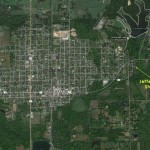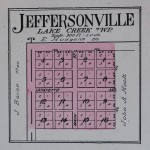Jeffersonville, now the eastern part of Johnston City, was a prosperous little village in Civil war days. The original survey of the village was made June 29, 1853 for the southwest corner of section 17, Lake Creek Township. The community had its post office, tobacco warehouse, blacksmith, saw and grist mills. The post office was known officially as Lake Creek, established December 10, 1852 in the farm house of Silas G. Hindman the first postmaster. In 1903 the post office was changed to Johnston City, but Jeffersonville retained its separate identity many years.
 Jeffersonville also had its nickname, “Shake Rag”, used more frequently than the official name. The rag’s shaking was a sign whiskey could be bought at the first building erected on the hill that became the site of Jeffersonville. Even when that mud roofed doggery had been torn down, the name stuck to the little town.
Jeffersonville also had its nickname, “Shake Rag”, used more frequently than the official name. The rag’s shaking was a sign whiskey could be bought at the first building erected on the hill that became the site of Jeffersonville. Even when that mud roofed doggery had been torn down, the name stuck to the little town.
Many Civil war enlistments took place at Jeffersonville. Every officer, both commissioned and non-commissioned, of Company B, 128th Illinois infantry claimed the village as his residence or post office address. So did many of the privates in the company.
When the war was over, a post of the Grand Army of the Republic was organized March 24, 1886 and named for James J. Dollins, Colonel of the 81st Illinois Infantry who was killed in the charge on Vicksburg May 22, 1863. Three companies of the regiment were Williamson County men, many of whom gave Jeffersonville as their home when enlisting. The first commander of the G.A.R. post was N.G. Perrine, succeeded in February 1887 by John Brown with H. Davis and M. Duncan as vice commanders. Post 562 was disbanded in the village were Andrew J. Duncan and E. L. Darrow. Mr. Darrow was a charter member of Lake Creek Masonic Lodge, and moved into the village from his nearby farm about 1882. He took over the management of this store from C.M. Bidwell, his partner. Mr. Darrow was deputy county surveyor many years.
Andrew J. Duncan was a son of William P. Duncan who lived on Schoharie Prairie. The son farmed also, but
during the war he became a merchant and tobacco dealer in the village. He entered business as a partner of James T. Powell, his father-in-law. Mr. Duncan became postmaster and his son made the best of his country school education, studied law, and moved to Marion to practice. Warren Webster “Webb” Duncan (1857-1938) was county judge from 1886-1890, circuit judge two terms, and justice of the Illinois Supreme Court two terms.
Another of the schoolboys from a nearby farm was William Henry Hart. He moved to Benton to become a lawyer and was elected Franklin County judge. His son practiced law with Judge Hart.
Jeffersonville Christian Church was organized shortly after the Civil war by Elder Matthew f. Wilson. The preacher for many years was Elder William L. Crim.
See also, Johnston City History
(Extracted from Pioneer Folks and Places, Barbara Barr Hubbs, 1939, on sale at the Williamson County Museum)

